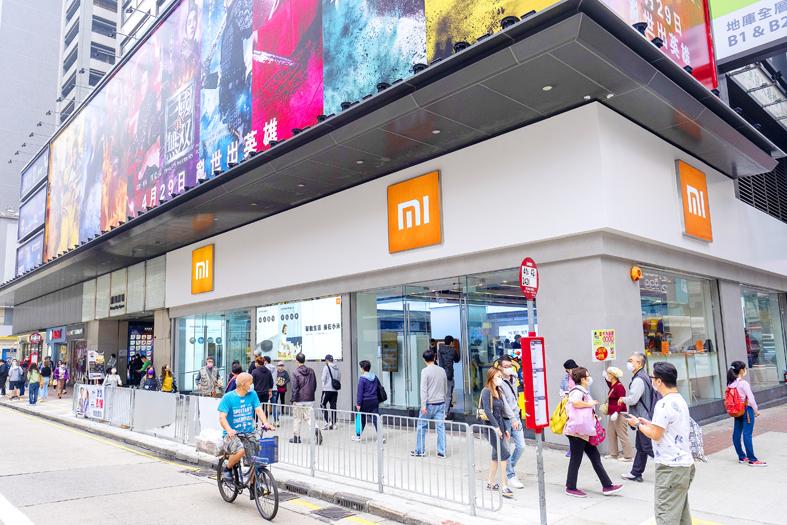China’s banking regulator criticized an online lender backed by Xiaomi Corp (小米) over a range of breaches, in the latest sign of intensifying scrutiny on the financial operations of the nation’s technology behemoths.
Sichuan XW Bank Corp (四川新網銀行), one of China’s three Internet banks, was found to charge interest rates of as high as 30 percent on consumer loans with an auto financing platform, and failed to follow risk assessment and debt collection regulations, the China Banking and Insurance Regulatory Commission said in a statement yesterday.
The admonishment came after consumer complaints against the lender have increased significantly since the end of 2019, the regulator said.

Photo: Bloomberg
While no punishment was announced, the commission said that all banks and insurers should conduct a self-investigation into their cooperation with third-party platforms and protect consumers’ rights.
China has escalated a campaign to curb the influence of its tech corporations after the top leadership pledged to expand oversight of financial technology, stamp out monopolies and prevent the “unregulated” expansion of capital.
The commission on Wednesday also prohibited online platforms from lending to college students.
Founded in late 2016 by a group of private conglomerates, XW Bank, along with Ant Group Co’s (螞蟻集團) MYbank (網商銀行) and Tencent Holdings Ltd’s (騰訊) WeBank (微眾銀行), operates without any brick-and-mortar branches.
New Hope Group (新希望集團) holds a 30 percent stake as the largest shareholder, followed by Xiaomi with a 29.5 percent stake via a unit.
The bank had 44 billion yuan (US$6.8 billion) of assets by the end of 2019, its annual report said.

AI BOOST: Although Taiwan’s reliance on Chinese rare earth elements is limited, it could face indirect impacts from supply issues and price volatility, an economist said DBS Bank Ltd (星展銀行) has sharply raised its forecast for Taiwan’s economic growth this year to 5.6 percent, citing stronger-than-expected exports and investment linked to artificial intelligence (AI), as it said that the current momentum could peak soon. The acceleration of the global AI race has fueled a surge in Taiwan’s AI-related capital spending and exports of information and communications technology (ICT) products, which have been key drivers of growth this year. “We have revised our GDP forecast for Taiwan upward to 5.6 percent from 4 percent, an upgrade that mainly reflects stronger-than-expected AI-related exports and investment in the third

Mercuries Life Insurance Co (三商美邦人壽) shares surged to a seven-month high this week after local media reported that E.Sun Financial Holding Co (玉山金控) had outbid CTBC Financial Holding Co (中信金控) in the financially strained insurer’s ongoing sale process. Shares of the mid-sized life insurer climbed 5.8 percent this week to NT$6.72, extending a nearly 18 percent rally over the past month, as investors bet on the likelihood of an impending takeover. The final round of bidding closed on Thursday, marking a critical step in the 32-year-old insurer’s search for a buyer after years of struggling to meet capital adequacy requirements. Local media reports

TECHNOLOGICAL RIVALRY: The artificial intelligence chip competition among multiple players would likely intensify over the next two years, a Quanta official said Quanta Computer Inc (廣達), which makes servers and laptops on a contract basis, yesterday said its shipments of artificial intelligence (AI) servers powered by Nvidia Corp’s GB300 chips have increased steadily since last month, should surpass those of the GB200 models this quarter. The production of GB300 servers has gone much more smoothly than that of the GB200, with shipments projected to increase sharply next month, Quanta executive vice president Mike Yang (楊麒令) said on the sidelines of a technology forum in Taipei. While orders for GB200 servers gradually decrease, the production transition between the two server models has been

ASE Technology Holding Co (日月光投控), the world’s largest integrated circuit (IC) packaging and testing supplier, yesterday announced a strategic collaboration with Analog Devices Inc (ADI), coupled with the signing of a binding memorandum of understanding. Under the agreement, ASE intends to purchase 100 percent shares of Analog Devices Sdn Bhd and acquire its manufacturing facility in Penang, Malaysia, a press release showed. The ADI Penang facility is located in the prime industrial hub of Bayan Lepas, with an area of over 680,000 square feet, it said. In addition, the two sides intend to enter into a long-term supply agreement for ASE to